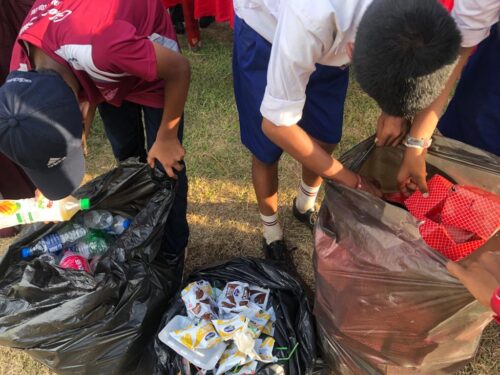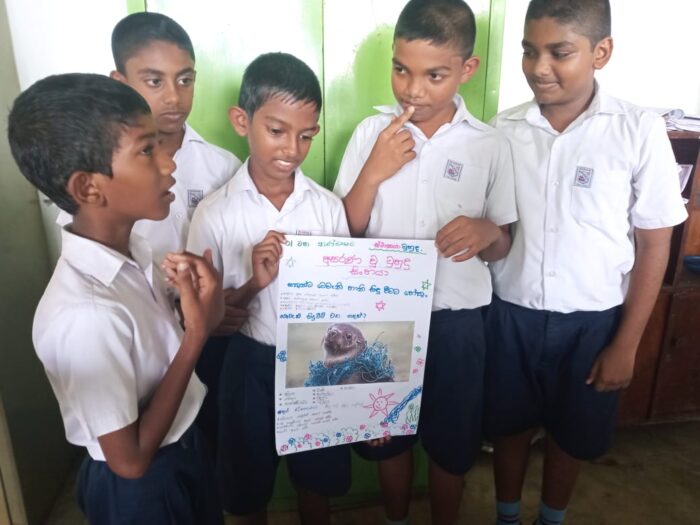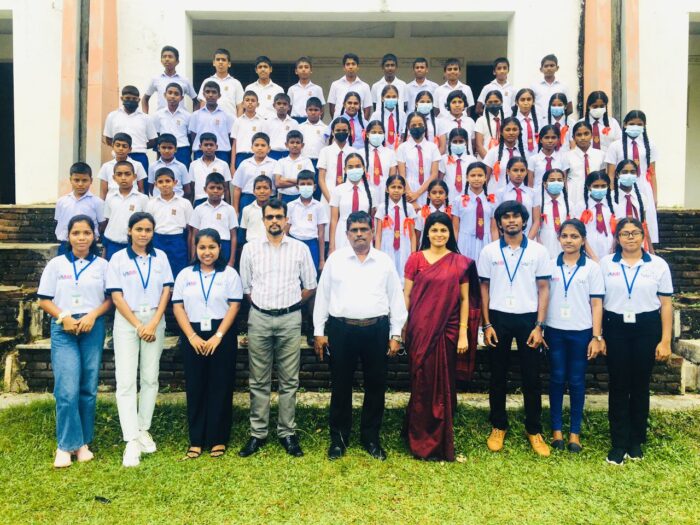From the Field: Empowering Youth as Agents of Change to Reduce Ocean Plastic Pollution

The world produces twice as much plastic waste as two decades ago, and only 9 percent of that waste is recycled.1 The resulting pollution is having far-reaching human health and environmental impacts that are just starting to be understood. Today’s youth—defined by the United Nations as anyone between the ages of 15 and 24—have grown up in a world surrounded by plastic pollution. They are the generation at the tipping point of this crisis and bear the burden from nearly a century of accumulated plastic waste, much of which has made its way into our oceans.
In Sri Lanka, youth make up over a quarter of the population—over 5 million people.2 As a densely populated, low-lying island nation, Sri Lanka faces multiple challenges managing its solid waste, especially plastic, which is estimated at nearly 1.6 million metric tons per year. In response, the Government of Sri Lanka demonstrated bold action in banning single-use plastics in June 2023, which has prompted Sri Lanka’s youth and others to get involved in the waste recovery effort.
USAID’s Clean Cities, Blue Ocean – the Agency’s flagship global program to address ocean plastic under the Save our Seas Initiative – is working to educate and motivate school children as agents of change to reduce the plastic waste entering our oceans.
USAID and the Zero Plastic Movement: School Championship Project
In 2022, Clean Cities, Blue Ocean formed a partnership with the Zero Plastic Movement—an organization that promotes social and behavior change among Sri Lankans—the Galle Municipal Council, and the Southern Province Education Department to launch the School Championship Project. The project aimed to foster a sense of environmental stewardship in school children and encourage their participation in a circular economy.
The School Championship Project engaged 24 public schools in the City of Galle—for students ranging in ages from nine to 18—to introduce a plastic collection model where schools could earn cash for the plastic they collected. The project trained over 1,300 secondary school students, responsible for training their peers. The students received training on the basics of plastic, including what it is and decomposition rates based on different types of plastic (e.g., HDPE shampoo bottles, LDPE grocery bags, PVC pipes). They discussed the environmental and public health implications of plastic pollution to learn more about the broader impacts associated with plastic waste—such as the climate crisis.

Before my first training, I was not aware of how improper plastic disposal practices affect marine and terrestrial animals and I was used to a plastic throw-away culture. Soon after I went home and talked with my mother about the environmental damage of improper waste disposal and we started to segregate our domestic waste.
Grade 6 Student from Piyatissa College Galle
Students were then shown how to collect and separate plastic as part of the new school collection model, where the Galle Municipal Council has agreed to “offtake” or purchase and transport plastic to the Construction Waste Management Center, a recycling center in Dadalla— located, on average, three miles away from each school.
The project included a competition that awarded the top three schools that collected the most plastic with a school information management system provided by Blue Smart Solutions; the top three individual students received Lumala Bicycles; and ten youth volunteers were awarded a career guidance and skill development course provided by the mentoring organization Mentoroof. In addition to the competition, each school formed its own Zero Plastic School Club to lead the plastic bottle collection effort and empower young leaders in promoting behavior change and the 3Rs—reducing, reusing, and recycling practices.
I noticed that adults were ready to acknowledge the environmental impact of plastics when I talked about it with them, because they had some prior knowledge from reading articles in newspapers and were supportive of my practicing the 3Rs. Immediately after my first day with the Zero Plastic Initiative I started repurposing PET (Polyethylene terephthalate) as planters.
Grade 8 student from Muslim Ladies College
Clean Cities, Blue Ocean is also building on existing partnerships to augment the work in schools. For example, Coca-Cola Beverages Sri Lanka donated five large recycling bins for collecting PET bottles to facilitate recycling in schools, and on Earth Day they co-organized a training for 60 students about the value of waste and the importance of a circular economy. Planto Ceylon Pvt Ltd, an organic food manufacturer and supplier, also sponsored a recycling bin. A final awards ceremony honoring the students was co-sponsored by Jetwing Hotel.
Since February 2023, USAID has trained over 1,300 students and formed 24 Zero Plastic Clubs—reaching nearly 40,000 students in total. As a result of these efforts, approximately 2 metric tons of plastic—the equivalent of over 216,000 plastic bottles—were collected and sent for recycling. Furthermore, this model will establish a long-term additional payment system for the schools by collecting discarded plastic waste.

The work is raising awareness on the environmental and health impacts of improper plastic waste disposal and showing students and their families ways to safely collect and clean non-degradable plastic waste—to encourage the adoption of more sustainable plastic consumption practices across Sri Lanka.
Clean Cities, Blue Ocean is part of the Save Our Seas Initiative—USAID’s flagship initiative to combat ocean plastic pollution globally. Designed to support implementation of the U.S. Government’s Save Our Seas Act 2.0 of 2020, this initiative is supporting 14 country and regional programs in key geographies that represent 40 percent of total global mismanaged plastic waste. By strengthening waste management and advancing or building circular economies, city by city, USAID builds sustainable solutions that reduce ocean plastics while empowering vulnerable populations and mitigating pollution that affects human health and our climate.
1OECD (2022), Global Plastics Outlook: Economic Drivers, Environmental Impacts and Policy Options, OECD Publishing, Paris, https://doi.org/10.1787/de747aef-en.

